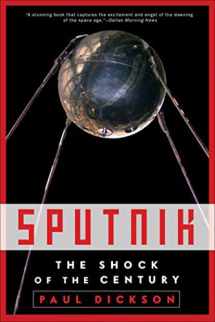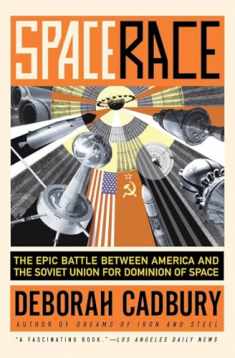
Sputnik: The Shock of the Century
Book details
Summary
Description
On October 4, 1957, as Leave It to Beaver premiered on American television, the Soviet Union launched the space age. Sputnik, all of 184 pounds with only a radio transmitter inside its highly polished shell, became the first man-made object in space; while it immediately shocked the world, its long-term impact was even greater, for it profoundly changed the shape of the twentieth century.
In his upcoming book, Washington journalist Paul Dickson chronicles the dramatic events and developments leading up to and emanating from Sputnik's launch. Supported by groundbreaking, original research and many recently declassified documents, Sputnik offers a fascinating profile of the early American and Soviet space programs and a strikingly revised picture of the politics and personalities behind the facade of America's fledgling efforts to get into space.
Although Sputnik was unmanned, its story is intensely human. Sputnik owed its success to many people, from the earlier visionary, Konstantin Tsiolkovsky, whose theories were ahead of their time, to the Soviet spokesmen strategically positioned around the world on the day the satellite was launched, who created one of the greatest public-relations events of all time. Its chief designer, however―the brilliant Sergei Korolev―remained a Soviet state secret until after his death.
Equally hidden from view was the political intrigue dominating America's early space program, as the military services jockeyed for control and identity in a peacetime world. For years, former Nazi Wernher von Braun, who ran the U.S. Army's missile program, lobbied incessantly that his Rocket Team should be handed responsibility for the first Earth-orbiting satellite. He was outraged that Sputnik beat him and America into space. For his part, President Eisenhower was secretly pleased that the Russians had launched first, because by orbiting over the United States Sputnik established the principle of "freedom of space" that could justify the spy satellites he thought essential to monitor Soviet missile buildup. As Dickson reveals, Eisenhower was, in fact, much more a master of the Sputnik crisis than he appeared to be at the time and in subsequent accounts.
The U.S. public reaction to Sputnik was monumental. In a single weekend, Americans were wrenched out of a mood of national smugness and post-war material comfort. Initial shock at and fear of the Soviets' intentions galvanized the country and swiftly prompted innovative developments that define our world today. Sputnik directly or indirectly influenced nearly every aspect of American life, from the demise of the suddenly superfluous tail fin and an immediate shift towards science in the classroom to the arms race that defined the cold war, the competition to reach the Moon, and the birth of the Internet.
By shedding new light on a pivotal era, Paul Dickson expands our knowledge of the world we now inhabit, and reminds us that the story of Sputnik goes far beyond technology and the beginning of the space age, and that its implications are still being felt today.


We would LOVE it if you could help us and other readers by reviewing the book
Book review




